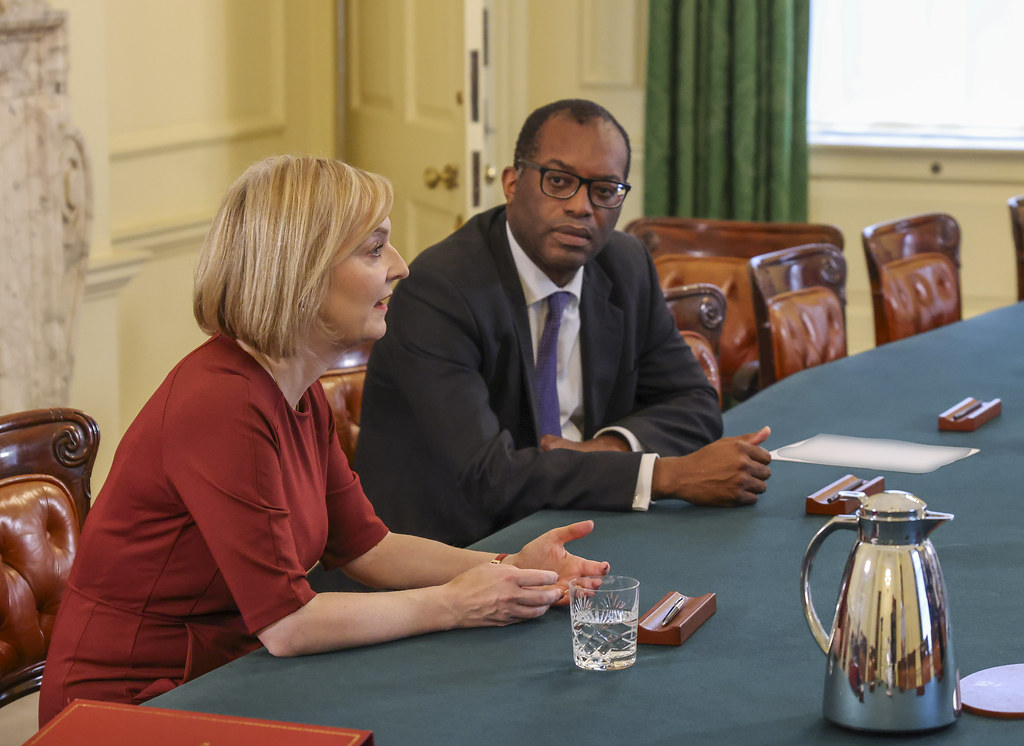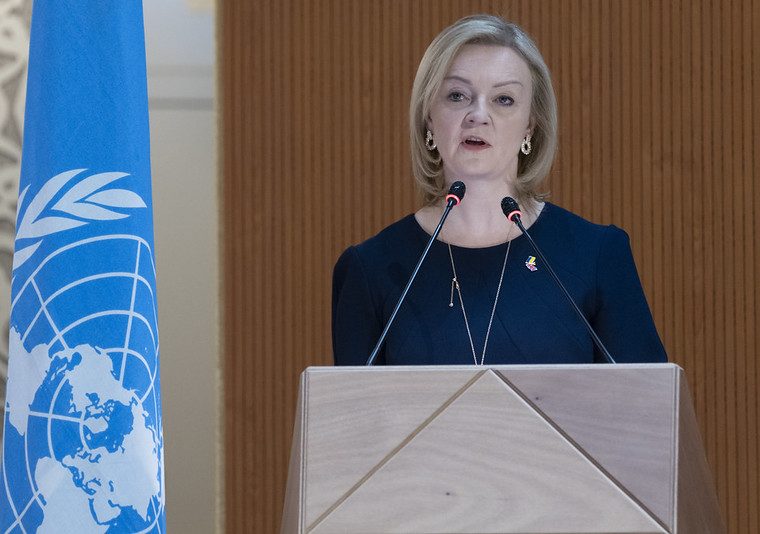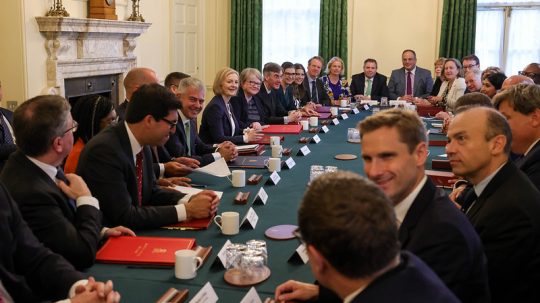Last week, Conservative politicians and members gathered in Birmingham for their first party conference of Liz Truss’s premiership. They watched as cabinet ministers and the prime minister set out their vision for the country in speeches and side events. It followed a tumultuous week in British politics where the chancellor’s announcement to cut the top rate of tax was followed by the pound plummeting and a U-turn from the government.
There were many protests throughout the conference both in and outside Birmingham’s International Convention Centre (ICC). But the spotlight was on Greenpeace when two members of staff, Rebecca Newsom and Ami McCarthy, stood up with a sign saying ‘Who voted for this?’ during the prime minister’s speech to protest Truss’s commitment to lift a ban on fracking.
BREAKING 🚨
Greenpeace activists have interrupted @TrussLiz speech at #CPC22 to denounce the prime minister 'shredding' her party’s 2019 manifesto promises.The PM is U-turning on fracking, strong climate action, and world-leading environmental protections.
Who voted for this? pic.twitter.com/f2SSn7hBu3
— Greenpeace UK (@GreenpeaceUK) October 5, 2022
In the Guardian, Newsom and McCarthy wrote: “Greenpeace UK analysis has identified at least seven areas across environmental protection, climate action, workers’ rights and tackling inequality where policies either confirmed or being considered by Truss and her ministers are at odds with the 2019 Conservative manifesto.”
So, what did we learn about the government’s approach to human rights in the UK from the Conservative party conference?
Deportation flights to Rwanda
The government will push forward with plans to deport some asylum seekers to Rwanda by proposing new legislation to prevent the European Court of Human Rights from blocking deportations, after it ruled against a flight.
In her speech to the conference, Truss said: “Our brilliant new home secretary will be bringing forward legislation to make sure that no European judge can overrule us.” She added that the government would “expand the Rwanda scheme”.
The UN Refugee Agency said the scheme “undermines” the 1951 Refugee Convention, which the UK helped to draft in the aftermath of the second world war.
Home secretary Suella Braverman said during an event that it was her “obsession” and her “dream” to see a flight take off to Rwanda, and that she wanted the UK to “ultimately” leave the ECHR, though this is not currently government policy. In her speech to the conference, she said she planned to stop small boat Channel crossings and ban migrants crossing the channel from claiming asylum. Refugee charities have said this breaches the Refugee Convention.
Workers’ rights
In his speech during Conservative party conference, chancellor Kwasi Kwarteng lambasted working people going on strike over job cuts, below-inflation wage proposals, working conditions and pensions. He said: “Pernicious strike action disrupts the lives of the British people and it slows down our economy. So, we will introduce important reforms to stop strike action from derailing our daily lives.”
The chancellor has previously announced plans to force unions to put every pay offer to members for a vote, which Mick Lynch, general secretary of the Rail, Maritime and Transport (RMT) union, called “anti-democratic”. In the UK, the right to strike is protected under Article 11 of the UK’s Human Rights Act (1998) – the right to freedom of assembly and association. Kwarteng, in his former role as business secretary, planned to legislate to allow agency workers to cover for workers on strike.
The prime minister appears to be on the same page as the chancellor. In her speech, she accused “militant unions” of being part of an “anti-growth coalition” in the country.
In response, Trades Union Congress general secretary Frances O’Grady told The Independent: “There’s only one anti-growth coalition in this country – and it’s the Conservatives and their ideological allies on Tufton Street,” referring to the street where several libertarian think tanks said to influence Truss’s thinking are housed.
Cuts to welfare?
The conference was dominated by a debate over welfare benefits, which were due to be raised in line with inflation in April. But Truss looks set to reverse the promise made by former prime minister Boris Johnson’s government.
Last month, the chancellor announced plans to cut corporation tax and national insurance in the government’s ‘mini-budget’ to the tune of £43bn, according to the Institute for Fiscal Studies. To combat the UK’s public debt from tax cuts, the government might instead choose to keep benefits, like Universal Credit, at their current level.
Liz Truss refused to rule the move out during the conference. Meanwhile, she committed to increasing defence spending to 3% of GDP by the end of the decade in her speech.
The UK is a signatory to the International Covenant on Economic and Social Rights, which states that countries should spend the “maximum available resources” to safeguard rights, such as the right to health, education and an adequate standard of living. Welfare cuts could amount to a violation of the covenant, especially during the current cost of living crisis when many are struggling to pay rising energy bills, food costs and rent.





